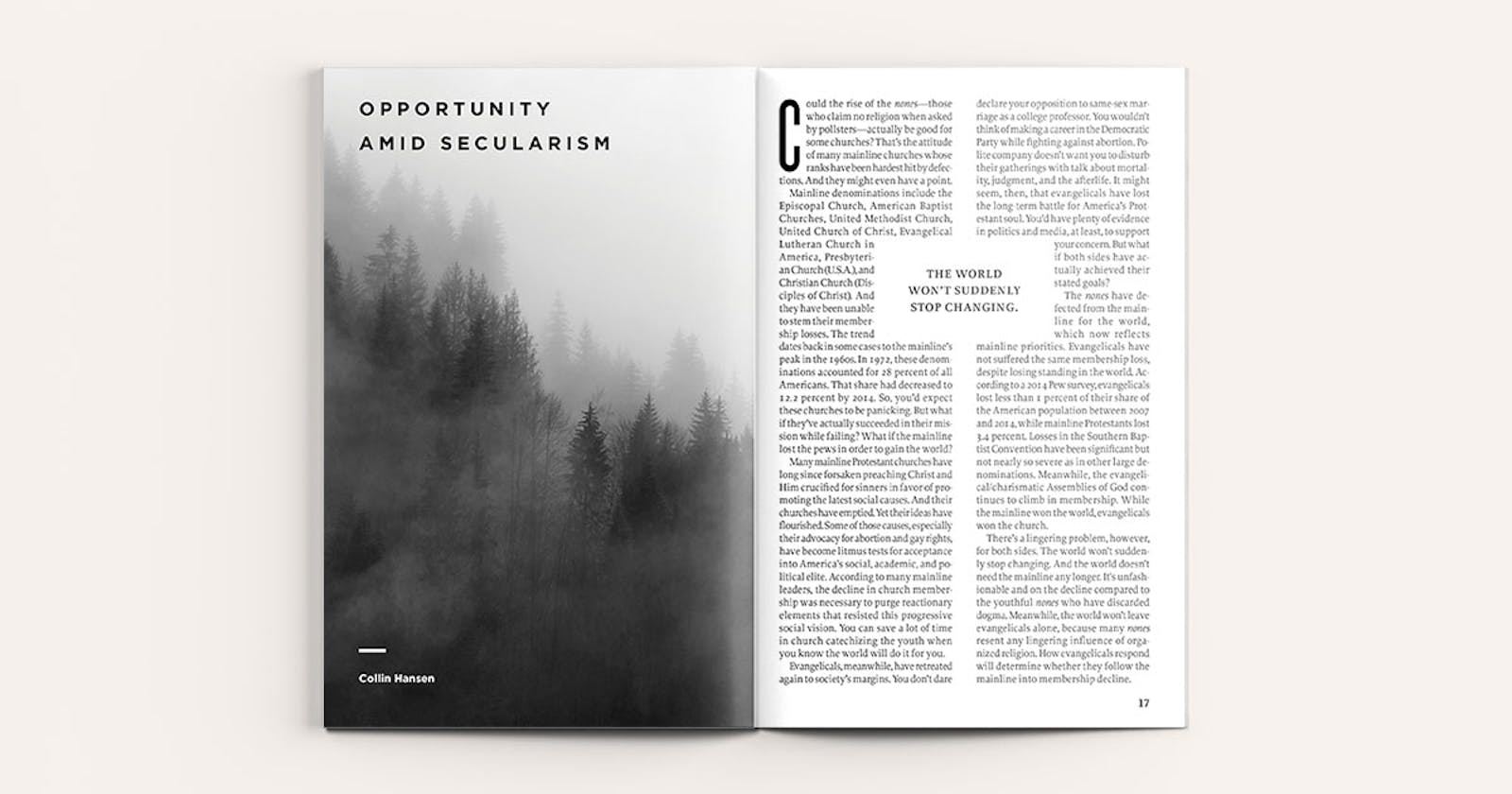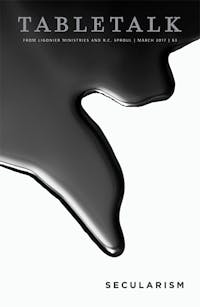
Request your free, three-month trial to Tabletalk magazine. You’ll receive the print issue monthly and gain immediate digital access to decades of archives. This trial is risk-free. No credit card required.
Try Tabletalk NowAlready receive Tabletalk magazine every month?
Verify your email address to gain unlimited access.
Could the rise of the nones—those who claim no religion when asked by pollsters—actually be good for some churches? That’s the attitude of many mainline churches whose ranks have been hardest hit by defections. And they might even have a point.
Mainline denominations include the Episcopal Church, American Baptist Churches, United Methodist Church, United Church of Christ, Evangelical Lutheran Church in America, Presbyterian Church (U.S.A.), and Christian Church (Disciples of Christ). And they have been unable to stem their membership losses. The trend dates back in some cases to the mainline’s peak in the 1960s. In 1972, these denominations accounted for 28 percent of all Americans. That share had decreased to 12.2 percent by 2014. So, you’d expect these churches to be panicking. But what if they’ve actually succeeded in their mission while failing? What if the mainline lost the pews in order to gain the world?
Many mainline Protestant churches have long since forsaken preaching Christ and Him crucified for sinners in favor of promoting the latest social causes. And their churches have emptied. Yet their ideas have flourished. Some of those causes, especially their advocacy for abortion and gay rights, have become litmus tests for acceptance into America’s social, academic, and political elite. According to many mainline leaders, the decline in church membership was necessary to purge reactionary elements that resisted this progressive social vision. You can save a lot of time in church catechizing the youth when you know the world will do it for you.
Evangelicals, meanwhile, have retreated again to society’s margins. You don’t dare declare your opposition to same-sex marriage as a college professor. You wouldn’t think of making a career in the Democratic Party while fighting against abortion. Polite company doesn’t want you to disturb their gatherings with talk about mortality, judgment, and the afterlife. It might seem, then, that evangelicals have lost the long-term battle for America’s Protestant soul. You’d have plenty of evidence in politics and media, at least, to support your concern. But what if both sides have actually achieved their stated goals?
The nones have defected from the mainline for the world, which now reflects mainline priorities. Evangelicals have not suffered the same membership loss, despite losing standing in the world. According to a 2014 Pew survey, evangelicals lost less than 1 percent of their share of the American population between 2007 and 2014, while mainline Protestants lost 3.4 percent. Losses in the Southern Baptist Convention have been significant but not nearly so severe as in other large denominations. Meanwhile, the evangelical/charismatic Assemblies of God continues to climb in membership. While the mainline won the world, evangelicals won the church.
There’s a lingering problem, however, for both sides. The world won’t suddenly stop changing. And the world doesn’t need the mainline any longer. It’s unfashionable and on the decline compared to the youthful nones who have discarded dogma. Meanwhile, the world won’t leave evangelicals alone, because many nones resent any lingering influence of organized religion. How evangelicals respond will determine whether they follow the mainline into membership decline.
No Illusion
At least since 1980, many evangelicals have been under the illusion that they represented a silent but devout majority in America committed to upholding biblical morals. That theory began to crack in 2006 when President George W. Bush lost his congressional majority. And it was finally put to rest in 2016 when the Religious Right could not agree on a candidate.
If you live on the coasts or in a major city, however, you’ve probably already stopped expecting the world to back your faith. You could never count on support from neighbors who didn’t share your biblical beliefs. So you have watched this dawning disenchantment of some evangelicals with detached concern.
“It used to be that the devout and the mushy middle—nominal Christians, people that would identify as Christians, people who would come to church sporadically, people who certainly respect the Bible and Christianity—the devout and the mushy middle together was a super majority of people who just created a kind of ‘Christiany’ sort of culture,” Redeemer Presbyterian Church pastor Tim Keller told a group of journalists in 2014. “The mushy middle used to be more identified with the devout. Now it’s more identified with the secular. That’s all.”
Longtime Newsweek religion editor Kenneth L. Woodward does not see a full-scale rush toward secularism in this decline. He does not expect the United States to adopt European-style secularism, because the number of religiously devout Americans has declined only slightly over the decades. “The likelier explanation is that institutional religion is experiencing a long-overdue winnowing effect,” Woodward writes. If this theory is correct, then evangelicals have lost one thing that means nothing—the illusion of greater influence. But they have lost something else that could matter a great deal—protection from allies across theological lines. These alliances warned governments against restricting the religious liberty of individual Christians, churches, and nonprofits. These alliances held together the primacy of the nuclear family—one man and one woman married and devoted to the well-being of their children. On a personal level, it meant you generally knew the values of the neighbors on your block even if you heard different sermons on Sunday.

Evangelicals will survive these changes, but we will need courage and conviction to keep our own house in order when we can’t count on any reinforcements from outside our faith family. It won’t be easy. But we have every reason to believe God will be faithful.
Purity and Dignity
Evangelical faith ought to be well-equipped to thrive even in such a situation. It’s not altogether different from the multicultural Mediterranean world of the New Testament, where Roman jurisprudence, Greek philosophy, and various Jewish schools of thought vied for influence. The Apostle Peter lays out two key elements of thriving evangelical faith in his first epistle:
Beloved, I urge you as sojourners and exiles to abstain from the passions of the flesh, which wage war against your soul. Keep your conduct among the Gentiles honorable, so that when they speak against you as evildoers, they may see your good deeds and glorify God on the day of visitation. (1 Peter 2:11–12)
Peter commends purity inside the church and dignity outside the church. You won’t see Peter explaining away or revising the Old Testament’s uncompromising sexual ethic. The passions of the flesh wage war against our souls, and we must not surrender. Such resistance requires greater spiritual resources than the mushy middle of mainline Protestantism could muster. Parents cannot expect the media, public schools, or government to do their dirty work. Be catechizing your children, or the world will be catechizing them for you.
I was talking with a fellow journalist last summer about the loss of religious liberty amid the rise of secularism and the decline of the mushy middle. I said I wasn’t worried about speech or assembly restrictions on local churches, in part because political coalitions and enforcement complications would make it impossible. I admitted, though, that I’m worried about our children. We spoke just a month after the Obama administration announced that all public schools must allow children to use bathrooms that correspond to their “gender identity” and not the sex on their birth certificate. What a tragedy it would be if our children grew up regarding biblical morality as a threat to American society. Then my fellow journalist dropped a bombshell.
“And what if it’s our own children who ultimately come after us?” she asked.
I had to admit the plausibility of her concern. Isn’t that the pattern in previous attempts to snuff out the church? But even such a doomsday scenario would not be outside Peter’s purview. We cannot control even our own children’s thoughts and values. As we raise them in the fear and admonition of the Lord (Eph. 6:4), though, we can conduct ourselves with honor. Even if our own children rise up to call us evildoers, Peter says they will see our good deeds and glorify God on the day of visitation.
Meaning and Belonging
The rise of the nones and secularism, along with the decline of the mushy middle, poses a challenge that many American evangelicals have never before faced. In a culture that broadly reinforced Christian values, purity did not need to distinguish the church. And if we didn’t think of ourselves as outsiders to the culture, we didn’t need to reflect on how our dignified behavior would set us apart, either.
The world has indeed moved away from the church, but it hasn’t yet discovered any better alternatives or lasting answers. Without even mushy values to guide them, youth will be lost in the search for meaning and identity. Woodward explains,
Rather than defining themselves through relationships formed within family, neighborhoods, churches, schools, and teachers, the young imagine—and culturally are encouraged to believe—that the point of growing up is to discover, nurture, and express an inwardly derived, original, and authentic self—independent of institutionally structured relationships with others.
Mainline Protestant values helped produce a world that doesn’t think it needs the church. But that world has not yet found anything outside the self to provide meaning or belonging. What an amazing opportunity, then, for the evangelical church to makes itself a refuge for the orphans of modernity.
In the good news of Jesus’ death and resurrection, sinners of every time and place and generation find communion with God in Christ and fellowship with His body, the church. If we lose the mushy middle but regain our prophetic witness, the next generation may yet yield the American church’s most fruitful years.
